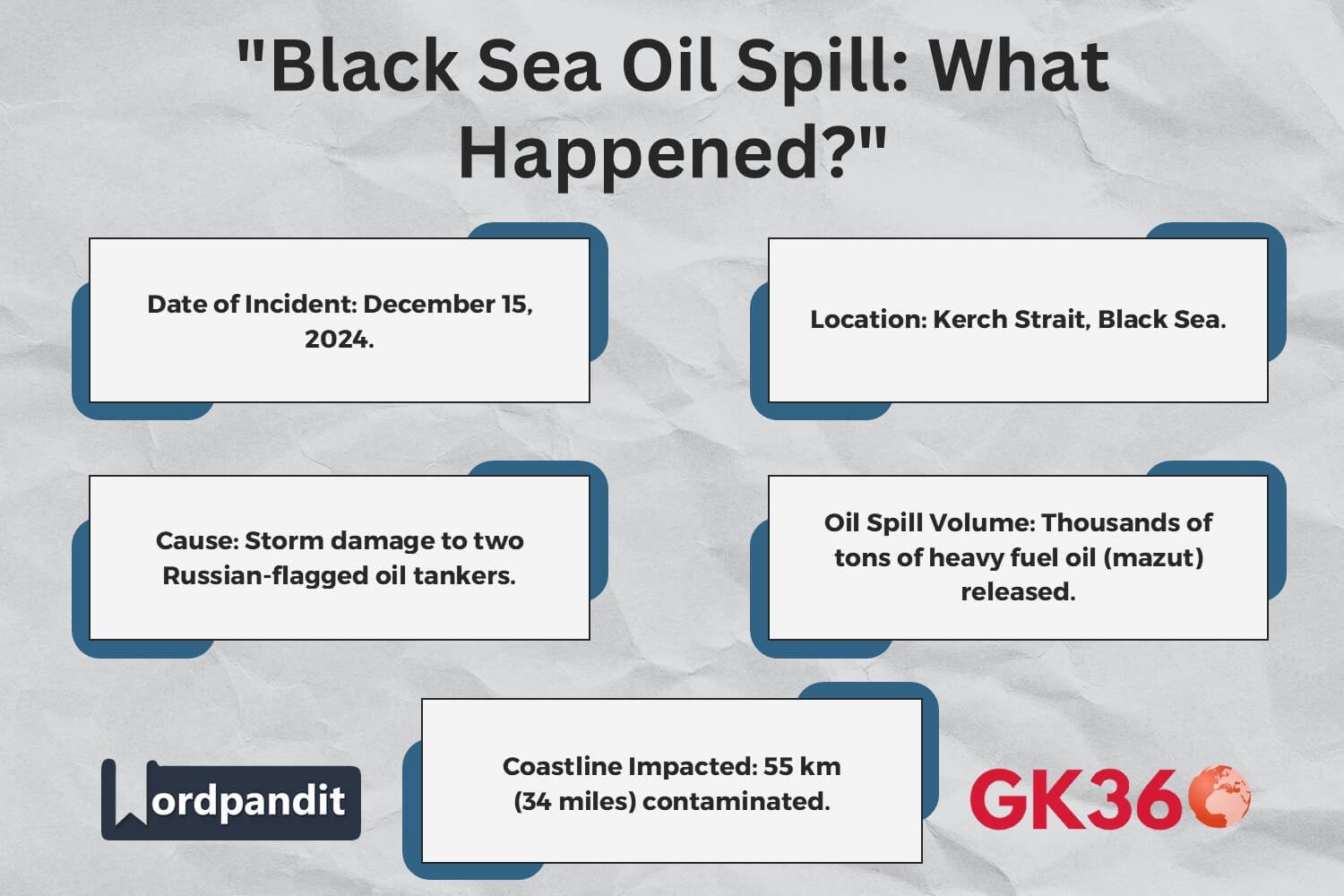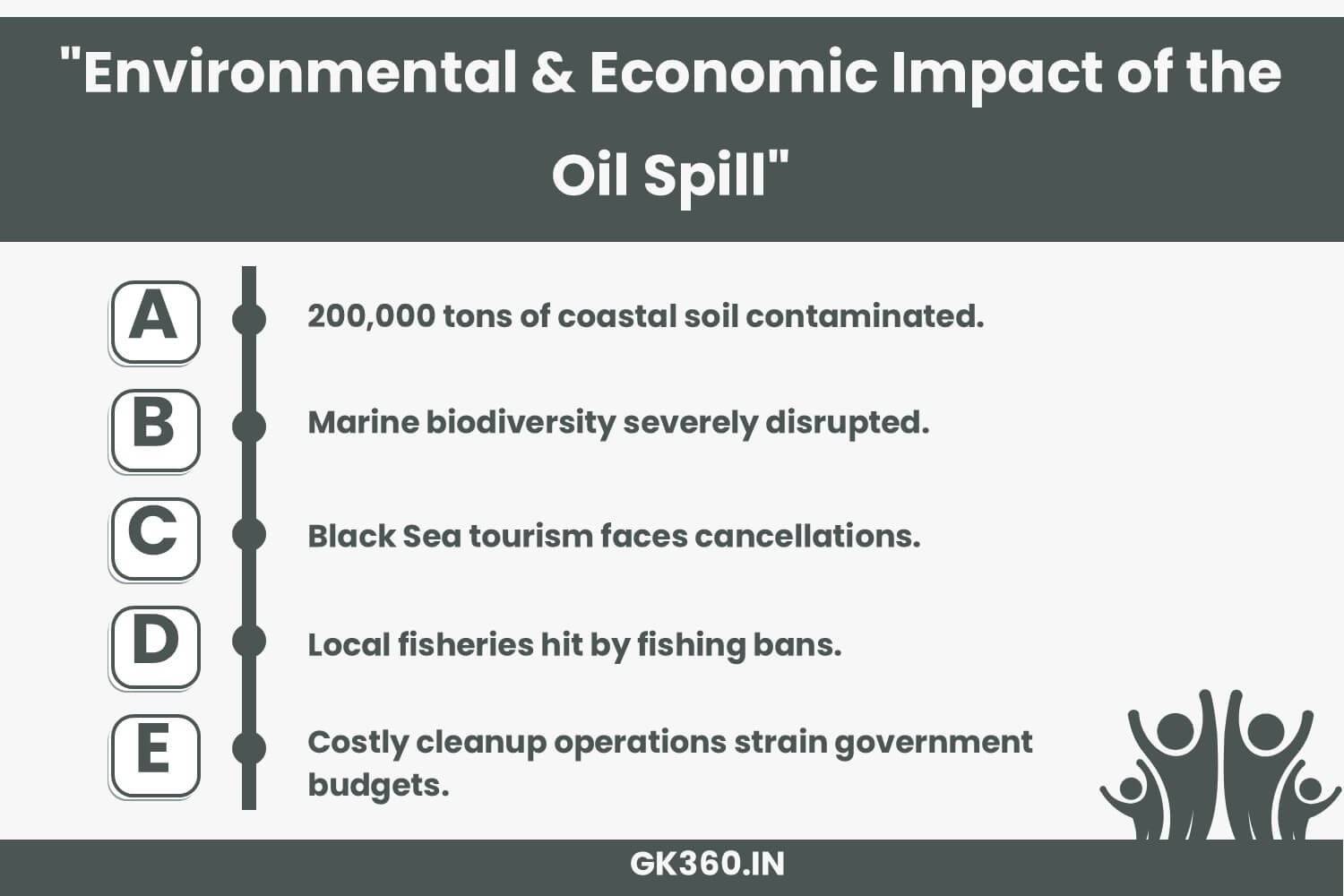Russia Declares Federal Emergency Over Black Sea Oil Spill: Impact & Response
Introduction: What Happened?
In a major environmental disaster, Russian authorities have declared a federal-level emergency following a catastrophic oil spill along the Black Sea coast. The spill, which occurred on December 15, 2024, has led to extensive pollution, severely affecting marine ecosystems, local communities, and the coastal economy. The failure of initial containment efforts has raised concerns about long-term environmental and economic consequences.

Table of Contents
- What Caused the Black Sea Oil Spill?
- How Bad is the Damage? Environmental & Economic Impact
- Government Response: Was It Too Late?
- Lessons from Past Oil Spills: What Can Russia Learn?
- What’s Next? Cleanup, Recovery & Prevention
- FAQs: What You Need to Know About the Black Sea Oil Spill
- Conclusion
What Caused the Black Sea Oil Spill?
On December 15, 2024, two Russian-flagged oil tankers suffered severe damage due to a powerful storm near the Kerch Strait. This incident resulted in the release of thousands of tons of heavy fuel oil (mazut) into the Black Sea, contaminating approximately 55 kilometers (34 miles) of coastline.
Experts believe that aged infrastructure, lack of stringent safety measures, and extreme weather conditions contributed to the spill’s magnitude.
How Bad is the Damage? Environmental & Economic Impact
Environmental Impact
- 200,000 tons of coastal soil contaminated
- Severe disruption to marine biodiversity
- Threats to fish populations and coastal wildlife
- Long-term damage to water quality and marine ecosystems
Economic Impact
- Tourism industry at risk: Black Sea resorts face cancellations ahead of the spring and summer seasons.
- Local fisheries devastated: Toxic contamination may lead to fishing bans.
- Cost of cleanup operations: Expected to soar, straining government budgets.
Government Response: Was It Too Late?
Despite early warnings, the initial response was slow and ineffective.
- December 15, 2024: Oil spill occurs.
- December 16-20, 2024: Local authorities attempt cleanup but lack necessary resources.
- December 21, 2024: Russia’s Emergency Situations Minister Alexander Kurenkov declares a federal-level emergency, unlocking additional federal funding and resources.
Public and environmental groups have criticized the delayed response, arguing that a faster reaction could have reduced the extent of contamination.
Lessons from Past Oil Spills: What Can Russia Learn?
Similar disasters worldwide provide key takeaways:
- Deepwater Horizon (2010, USA): Early intervention and global cooperation helped contain damages.
- Prestige Oil Spill (2002, Spain): Showed the dangers of using outdated tankers.
- Norilsk Diesel Spill (2020, Russia): Highlighted the need for stricter environmental regulations.
Key Lessons for Russia:
- Enhancing oil transport safety standards
- Investing in rapid spill-response technology
- Stronger environmental regulations for oil transportation
What’s Next? Cleanup, Recovery & Prevention
Cleanup Efforts Underway:
- Federal emergency teams deployed with specialized equipment
- Volunteers and environmental organizations assisting in the removal of contaminated soil
- Oil dispersion chemicals and barriers used to contain further spread
Future Prevention Strategies:
- Upgrading oil tanker safety measures
- Implementing strict disaster response protocols
- Developing advanced oil spill detection and mitigation systems

FAQs: What You Need to Know About the Black Sea Oil Spill
How long will the cleanup take?
Experts estimate a minimum of 6 months to several years, depending on the effectiveness of ongoing efforts.
Will the Black Sea coast be safe for tourism in 2025?
It depends on how quickly the contamination is managed. Authorities are hopeful but remain cautious.
What penalties will companies responsible for the spill face?
Investigations are ongoing, and fines or legal action against oil transportation firms may follow.
How does this compare to past oil spills?
While not as massive as the Deepwater Horizon disaster, the ecological and economic damage to the Black Sea region is severe.
How can the public help?
Donations to environmental cleanup organizations and volunteering in safe cleanup operations can support recovery efforts.
Conclusion
The Black Sea oil spill has exposed weaknesses in Russia’s environmental disaster preparedness. While government efforts have now intensified, delayed action exacerbated the crisis. This incident serves as a critical wake-up call for implementing stronger oil transport regulations, rapid response mechanisms, and environmental protections to prevent future catastrophes.
Key Takeaways Table
| Aspect | Details |
|---|---|
| Incident Date | December 15, 2024 |
| Location | Black Sea, near Kerch Strait |
| Cause | Oil tankers damaged by a storm |
| Oil Spilled | Thousands of tons of heavy fuel oil (mazut) |
| Coastline Affected | 55 km (34 miles) |
| Government Response | Declared federal emergency on December 21, 2024 |
| Cleanup Timeline | Estimated 6 months to several years |
| Economic Impact | Damage to tourism, fisheries, and local businesses |
| Future Prevention | Stricter oil transport safety & faster response protocols |
Related terms
- Black Sea Oil Spill 2024
- Russia Environmental Emergency
- Oil Spill Impact on Marine Life
- Black Sea Ecological Disaster
- Russia Oil Tanker Spill
- Kerch Strait Oil Spill Damage
- Oil Spill Cleanup Operations
- Government Response to Oil Spills
- Future of Black Sea Ecosystem
- Environmental Disaster Recovery





